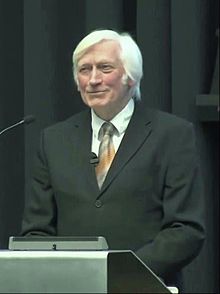Richard Overy
Appearance

Richard James Overy (born 23 December 1947) is a British historian who has published extensively on the history of World War II and the Third Reich. In 2007 as The Times editor of Complete History of the World he chose the 50 key dates of world history.
Quotes
[edit]War and Economy in the Third Reich (1994)
[edit]- Oxford: UK, Oxford University Press, 1994
- Hitler was ‘an enemy of free-market economics’ and a ‘reluctant dirigiste.’
- pp. 1–2
- [T]here could be no guarantee in a free market that the interests of race or state as Hitler defined them would take priority over the interests of businessmen or consumers. After 1933 the role of the state in regulating and directing economic life increased sharply, first in order to encourage economic revival, then to divert economic resources to the growth of German military power… [which] led, in an unplanned, incremental way, to the establishment of a kind of command economy.
- pp. 1–2
- Indeed, many businessmen seem on the evidence to have been wary of the closet anti-capitalism of the rank-and-file Nazis.
- p. 12
- During the years that followed, Hitler and the Nazi movement were anything but the tools of German big business.
- p. 12
- When the regime wanted additional industrial capacity or resources for the military economy which the private sector could not provide, it was created (or conquered) by the state… during the Third Reich state ownership expanded into the productive sectors, based on the strategic industries, aviation, aluminum, synthetic oil and rubber, chemicals, iron and steel, and army equipment. Government finances for state-owned enterprises rose from RM 4,000m in 1933 to RM 16,000m 10 years later; the capital assets of state-owned industry doubled during the same period; the number of state-owned firms topped 500.
- p. 16
- The outcome [of the Nazi economy] was a command economy, governed by military priorities, but run by a coalition of state officials, soldiers, party hacks and industrial technocrats.
- p. 17
- Industry was regarded entirely instrumentally by party, state and military, in terms of its ability to provide the sinews of war… The business community was characterized by a defensive opportunism in the face of state power.
- p. 17
- Historians now debate whether Britain had a ‘managed economy’ by 1939, the very term—die gelenkte wirtschaft—adopted by German economists in the 1930s to describe the Nazi economy.
- p. 17
- Nazi political hegemony in the end prevented German capitalists from acting as capitalists.
- p. 94
- In the long run the [Nazi] movement was moving to a position in which the economic New Order would be controlled by the Party through a bureaucratic apparatus staffed by technical experts and dominated by political interests, not unlike the system that had already been built up in the Soviet Union.
- p. 118
- Göring industrial empire represented, in this sense, one of the major steps towards restricting private industrial capitalism and substituting a ‘völkisch’, state-run industrial economy.
- p. 146
- The [Nazi] regime was also able to use the state-owned multi-nationals as a ‘battering ram’ for entering economies that were not occupied territory.
- p. 330
The Nazi economic recovery 1931-1938 (1996)
[edit]- Cambridge: UK, Cambridge University Press, 1996
- Some big businessmen did contribute to the Nazi election funds but German capitalism cannot be regarded, on the evidence, as having collectively brought fascism to power in any direct sense. Fascism in Germany was a mass movement brought to power through collusion with a bankrupt but traditional elite, not as the puppet of big business.
- p. 55
- It has been estimated that about one-fifth of Nazi voters and members were drawn from the manual work-force. After 1933 the number of workers in the Nazi Party went up, a product of opportunism perhaps as much as conviction.
- p. 58
The Dictators: Hitler's Germany and Stalin's Russia, (2004)
[edit]- W.W. Norton & Company, Inc., 2004
- In a remark made in 1932 to Otto Wagener, one of the party’s economic experts, Hitler observed that the business bourgeoisie “know nothing except their profit. ‘Fatherland’ is only a word for them.”
- p. 230

